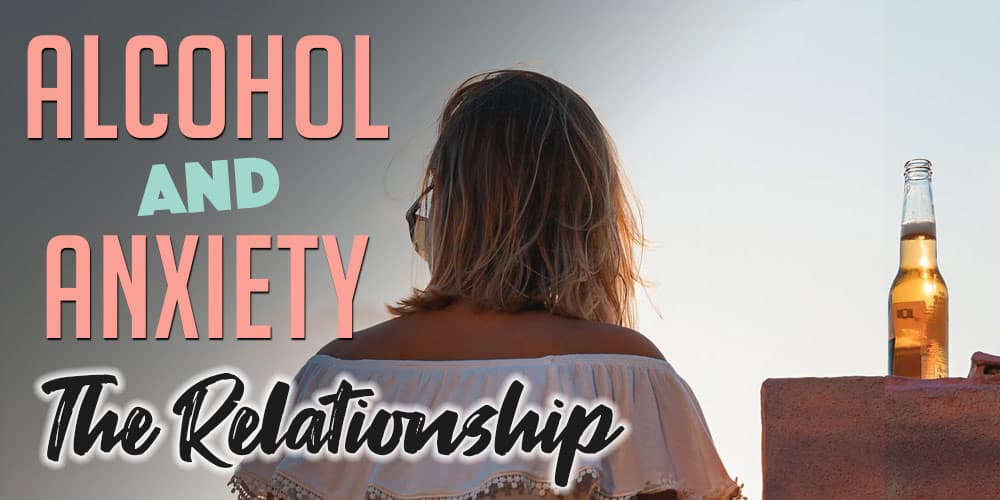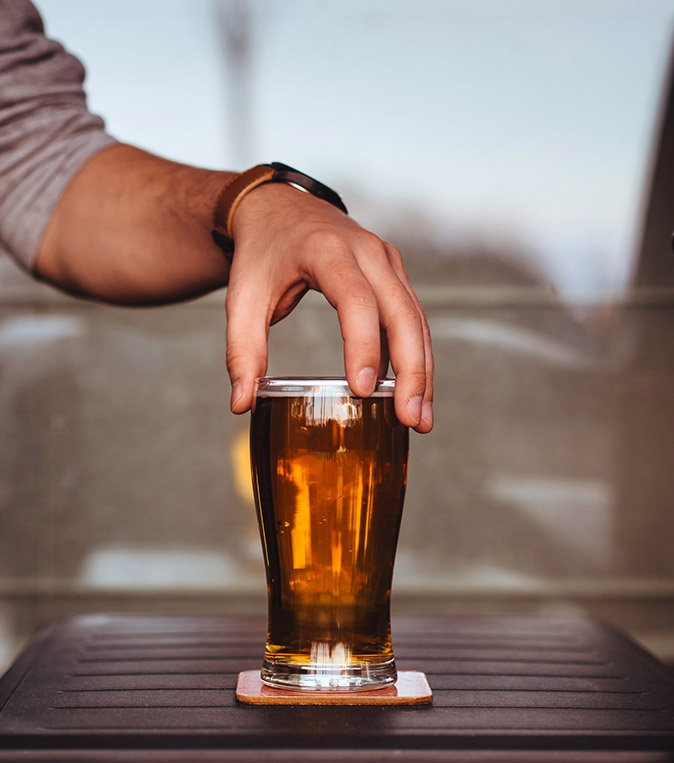
Is There a Relationship to Drinking Alcohol and Anxiety?
Alcohol affects our mood in many ways by altering brain activity. Alcohol also causes dehydration and alters blood sugar levels which can cause nervousness and shaking. Heavy drinking has been shown to increase the risk for developing anxiety disorder in many people.
What comes first anxiety disorder or alcohol misuse?
This can be a tricky question as people drink to soothe anxiety and alcohol can also trigger anxiety. The connection between anxiety and alcohol use disorder (AUD) after consuming alcohol is extremely common, so much so that “hangover anxiety” has earned its own name: hangxiety.
It’s important that people understand the relationship between alcohol and anxiety and what can be done about it.
What is Anxiety?
Anxiety is characterized by excessive feelings of uncontrollable worry or fear. Feeling anxious when studying for an exam or during a stressful life event is normal.
However, people who suffer from anxiety disorder have on-going fears and worries, and feel anxious most days. General Anxiety Disorder (GAD) is the most common type of anxiety.
Common Anxiety Symptoms include:
- Restlessness
- Fatigue
- Trouble Concentrating
- Tense muscles
- Disturbed sleep patterns
- Irritability
- Trembling
- Rapid or irregular heartbeat
- Sweating
Anxiety is a symptom of many conditions such as panic disorder, phobias, post-traumatic stress disorder (PTSD) and social anxiety disorder (social phobia).
40 million adults suffer from some form of anxiety and 15 million U.S. adults suffer from Social Anxiety disorder (SAD) alone. Alcohol or substance use in people with SAD is common as alcohol can make social interactions easier in the short term.
What Are the Types of Anxiety Disorders?
The Diagnostic and Statistical Manual of Mental Disorders (DSM-5) classifies anxiety disorders in three broad groups: Anxiety Disorders, Obsessive-Compulsive, and Related Disorders, and Trauma.
There are Five Main Types of Anxiety Disorders:
- Panic Disorder
- Post Traumatic Stress Disorder (PTSD)
- Social Anxiety Disorder (SAD)
- Generalized Anxiety Disorder (GAD)
- Obsessive-Compulsive Disorder (OCD)
If a person didn’t experience anxiety prior to substance use then they are diagnosed with substance-induced anxiety. During periods of intoxication or withdrawal from alcohol or drugs a person can experience substance or medication-induced anxiety disorder.

The Connection Between Anxiety and Alcohol
Addiction and anxiety often co-exist and have a bidirectional relationship. Drinking alcohol can trigger anxiety and should be avoided by people who struggle with anxiety disorder. Despite this, people with anxiety often use alcohol to relax in an attempt to temporarily ease their symptoms.
It’s common for people to unwind with alcohol to mitigate stress in their lives, and this is depicted in so many movies about alcoholism.
However, this approach can often trigger substance-induced anxiety or even cause anxiety disorder in some people.
According to the Anxiety and Depression Association of America (ADAA) – 20% of people with social anxiety disorder (SAD) also suffer from alcohol dependence.
How Alcohol Rewires the Brain
Drinking alcohol knocks the brain out of balance by disrupting the body’s natural homeostasis. To counteract the pleasure resulting from drinking alcohol, the brain releases a chemical called dynorphin.
This chemical remains in the blood stream for up to 10 days after drinking and reduces pleasure – not only from alcohol, but everyday activities become duller and less enjoyable as well due to the effects of dynorphin.
The connection between anxiety and alcohol consumption can be observed on a molecular level. A study carried out by the University of North Carolina School of Medicine showed that the effects of heavy alcohol use on the brain can alter an alcoholic’s ability to recover from a traumatic event – putting heavy alcohol users at risk for PTSD and anxiety disorder.
Researchers compared the brains of mice that had consumed alcohol and were exposed to stressful situations and observed that nerve cells in the prefrontal cortex of the alcohol-exposed mice had a different shape than those of other mice not exposed to alcohol.
Alcohol Reduces Quality of Sleep
Drinking alcohol enhances or mimics the neurotransmitter GABA. GABA soothes excitability in the brain, and can therefore promote a good night’s sleep.
But once GABA is metabolized, an opposite effect occurs and it can also affect sleep patterns, worsening the effects of alcohol-induced anxiety.
Although many people use alcohol to get to sleep, drinking alcohol reduces restorative rapid eye movement (REM sleep).
This impacts the quality of sleep, which can cause drowsiness or memory problems the next day, even after the effects of alcohol have worn off.
Drinking Alcohol to Overcome Anxiety
The effects of alcohol can be felt within about 30 minutes. Alcohol is highly addictive and a depressant that is often used to escape or cope with life’s problems.
While a few drinks a week are not harmful – people who drink to overcome anxiety can overindulge and drink excessive amounts.
The highs from drinking alcohol are short-lived as serotonin and dopamine offer calm for around 2 hours, after which the body can take over a week to recover. Intoxication from alcohol impairs cognitive abilities both in the short term and also longer term.
Things become more problematic for long-term drinkers trying to manage anxiety because they can develop an addiction to alcohol from drinking too much alcohol or too frequently. The only remedy is a detox program to overcome alcohol withdrawal followed by an alcohol treatment recovery program.
The National Institute on Alcohol Abuse and Alcoholism (NIAAA) states that heavy drinking is defined as 14 drinks for men and 7 drinks for women (and people over the age of 65) per week. “One drink” means 1 bottle of beer, 1 glass of wine, or 1.5 oz. of a spirit like vodka.
Related: Anxiety Disorder Treatment and Addiction

What Triggers Anxiety After Drinking Alcohol?
While there are some genetic reasons for people to reach for a drink, there are also other factors like dehydration and heart rate changes that can cause anxiety after drinking.
The altered heart rate alone can trigger a panic attack in some people when the anxiety gets so severe. The effects of alcohol withdrawal can cause stress headaches, hallucinations and other symptoms of anxiety, which can be very troubling.
There’s a clear link between alcohol use disorders (AUDs) triggering anxiety disorders. Some of the reasons for this relationship include sleep disruption, brain rewiring, social problems and alcohol withdrawal.
Treating alcohol addiction alone can lead to the person relapsing to deal with the symptoms of anxiety. Therefore, co-occurring mental illnesses must be treated at the same time as substance or alcohol abuse.
Treatment for Co-Occurring Anxiety and Alcohol Abuse
Self-medication with alcohol and anxiety disorders is common. However, the long-term effects outweigh the temporary relief.
Treating substance addiction alone will not always address any co-occurring anxiety disorder.
Therefore a dual diagnosis treatment program that treats both conditions at the same time is required. A holistic approach is needed so that a full recovery is possible.
Related Posts
- Is Hangxiety (Hangover Anxiety) From Alcohol a Real Thing?
Have you ever experienced a bout of hangover anxiety after a night of drinking alcohol?…
- Alcohol Dementia Causes, Symptoms and Treatment
Note: Alcohol Dementia goes by many names including, alcohol-related dementia, alcoholic dementia, and alcohol-induced dementia.…
- High-Functioning Anxiety Symptoms and Treatment
Anxiety disorders are the most common form of mental illness in the United States. They…
